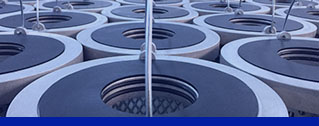
Filters are a small but very important a part of hydraulic equipment, though serving no mechanical goal they're integral to the correct functioning of the machine and to prolonging the energetic lifetime of the tools and the hydraulic fluid which drives it. The position of a filter is to remove and/or include particles of contamination and hold the fluid that flows around the machine clear. Any contamination in the oil can cause damage to moving components additional downstream, and this may lead to seizing up of moving parts, corrosion of different elements and dear replacements. When we consider the results of not using a filter, the significance of those little items turns into extra significant.
Â
There are two most important styles of hydraulic oil filter – floor and depth filters. The surface filter, because the identify suggests, removes contamination from the surface of the oil and could also be useful in functions where gravity feeds the oil via an area suitable for such a filter throughout operation. A depth filter may be submerged in a reservoir or chamber and can remove particles from everything of the physique of fluid. Depth filters therefore, are more practical and will retain a larger amount of contamination and unwanted particles earlier than they must be cleaned or changed.
Â
The supplies used to make hydraulic filters varies, as does the cost accordingly. Glass filters are dearer however they are extra efficient, particularly when glass fibres are utilized in a depth filter. Glass is also non-reactive, which means it may be used with any type of hydraulic fluid. Metallic filters are additionally reasonably efficient, however they can't be used with all kinds of hydraulic fluid, as a result of incompatibilities between sure hydraulic oils and a few metals. The place it's appropriate to use a metallic filter there may be the choice of a magnetic filter system, which works as a depth filter and makes use of a magnetic cost to draw metal particles that may have entered the fluid system. If the hydraulic gear is used in metallic working and fabrication then the prospect of potential contamination being from metallic particles is excessive; magnetic filters will take care of this contamination whereas one other kind of filter can be utilized to take care of different types of pollution.
Â
Cellulose or paper may also be used to make a hydraulic fluid filter, but these have a short life expectancy and need frequent replacement. They are cheaper than the other types, however may find yourself costing extra in the long run, attributable to common downtime for substitute and the potential injury to machinery if they are not replaced usually sufficient.
Â
It might appear to be glass is the only option; despite costing a little extra it does the most effective job and will not want replacing too often. The downside of a glass filter is definitely its strength as well; the superior filtering ability can really lead to a drop in pressure, in the system, which is usually undesirable. It is very necessary, therefore, to test how a drop in hydraulic system strain will affect productiveness and performance if you're considering switching to glass filters from one other material sort. Consider additionally whether this drop in strain is likely to lead to pointless adjustments of pressure aid valves, leading to doubtlessly dangerous construct ups of stress elsewhere.
Â
The options of hydraulic oil filters don't finish after material sort and building, as there's nonetheless the problem of ratings and specs to contend with. All filters have an ISO 4406 score, and the decrease the code of any given filter, the higher it's at removing contamination. Hydraulic filters may additionally have a beta ratio, which is the ratio of particles found upstream of the filter divided by the number found downstream. For beta ratios, the upper it's the higher, and this can also be used to offer a share for effectiveness.
Â
It can be important to examine that the circulation rate of the filter is compatible with the stream charge of the equipment it's for use in; too quick and the filter will not be able to effectively remove contamination, too slow and it could develop into clogged shortly. The operational strain of the hydraulic system can also be necessary, because the filter must have the ability to stand up to that drive for a protracted amount of time. The final thing to check is that the filter could be connected to the tools, so test the port dimension of the filter and guarantee it is compatible with the equipment within the location it is to be fitted.
Â
There is a lot to contemplate right here, but choosing the most appropriate hydraulic fluid filter is an train that it is price spending a while on, as it will probably make an enormous difference Additional hints to the efficiency and lifespan of your hydraulic gear and save on downtime and replacement prices in the long run.